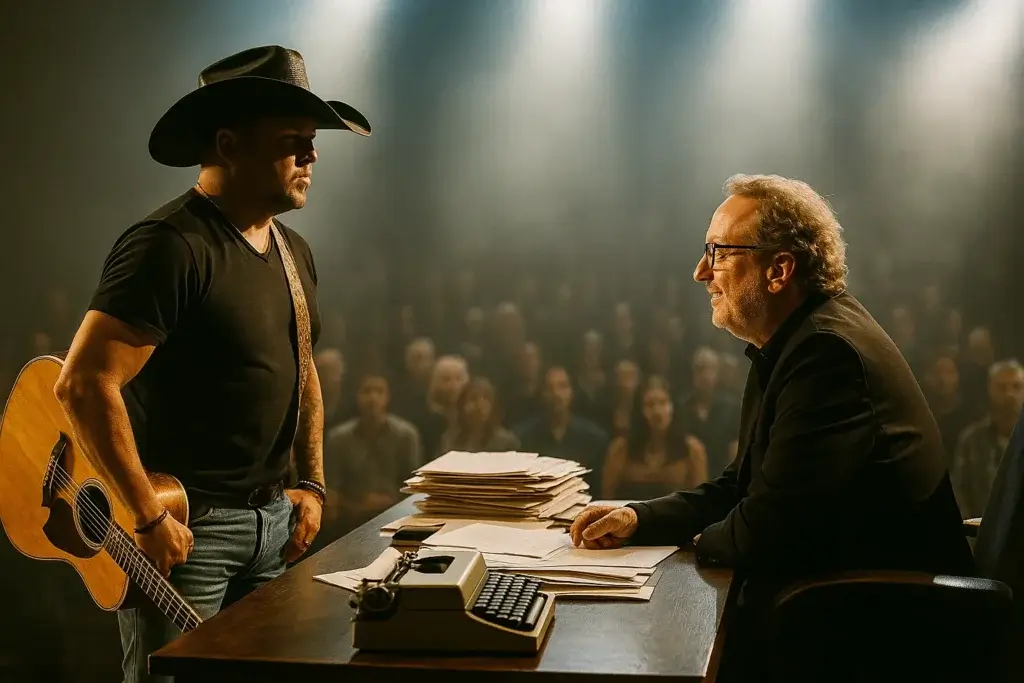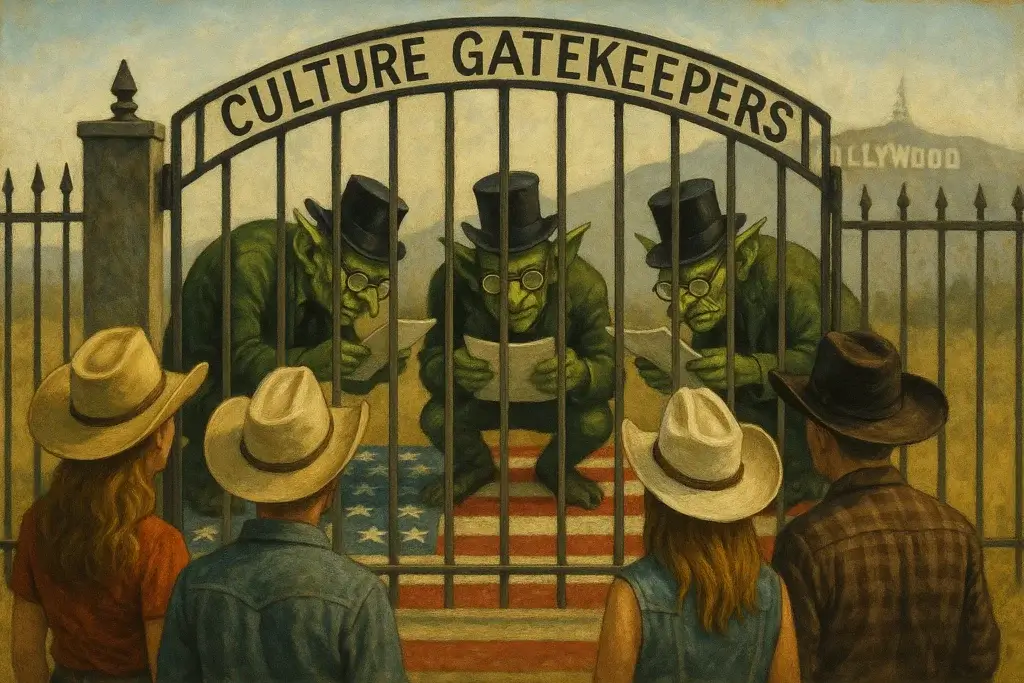Chris Willman has spent decades writing about music. He’s won awards, covered legends, and built a reputation—which makes his July 2023 hit piece in Variety attacking Jason Aldean’s “Try That in a Small Town” not just a bad review, but an act of professional betrayal. This isn’t criticism; it’s activism in critic’s clothing.
This article isn’t written in anger. It’s written in accountability. Willman’s column, cloaked in the language of critique, is an act of journalistic malpractice—an ideologically motivated attack masquerading as music criticism.
A Review Without a Review
Let’s start with the obvious: there’s no music criticism in Willman’s review. Not a single line of analysis about Aldean’s vocal delivery, the production quality, the structure of the song, the melody, or its musical roots in modern country. Instead, we’re treated to a political screed dressed up as a review. That’s not criticism—it’s activism.
Willman opens with an insult, calling it “the most contemptible country song of the decade.” That’s not a lead—it’s a verdict. From there, the column only spirals deeper into moral grandstanding.
Misrepresentation and Straw Man Arguments
Willman claims the song “conflates the act of protesting with violent crime.” But anyone who listens to the lyrics can hear the distinction Aldean makes: he names sucker punches, carjackings, and spitting in cops’ faces. These are not political protests. They are crimes.
Willman has to invent a straw man—pretending Aldean is condemning all protest—so he can righteously tear it down. This is dishonest, and Willman knows better.
Character Assassination Masquerading as Critique
Unable to mount a serious lyrical or musical critique, Willman instead questions Aldean’s right to even sing the song. He points out Aldean’s childhood in Macon, Georgia, and his adult life in Nashville—as if only people from towns with a population under 5,000 are allowed to write about small-town values.

By Willman’s logic, Springsteen can’t write about working-class grit because he lives in a mansion, and Dylan can’t sing about war because he never served. It’s absurd. And it’s not just elitism. It’s personal attack in disguise.
The Courthouse Canard
Willman leans heavily on the fact that Aldean’s video was filmed near a Tennessee courthouse where a lynching occurred a century ago. He insinuates intentional provocation, yet provides no evidence—because none exists. Aldean has denied any knowledge of the location’s history, and the courthouse itself is simply a recognized civic symbol.
Willman’s insinuation isn’t journalism; it’s guilt-by-geography, a cheap narrative shortcut for those who prefer moral certainty to truth.
Cultural Deafness: The Critic Who Doesn’t Hear Country
Chris Willman may have spent years in music journalism, but this review reveals a glaring blind spot: he doesn’t understand country music—or the people who cherish it.
Country isn’t just a genre. It’s a cultural expression of faith, family, loyalty, and local identity. It tells stories about hard work, heartbreak, and holding your ground. When Willman mocks Aldean’s message of small-town resilience, he’s not just criticizing lyrics—he’s dismissing the worldview of millions of rural Americans.

And it’s not just misunderstanding. It’s contempt. Like so many West Coast elites, Willman views flyover country as backward, regressive, and suspect. His review drips with the quiet smugness of someone who believes patriotism is a dog whistle and self-defense is a moral failure.
This isn’t just a bad take. It’s the sound of a gatekeeper slamming the door on the culture he was supposed to understand.
Signaling, Not Criticism
Chris Willman wasn’t talking to Jason Aldean. He wasn’t talking to small-town America. He wasn’t even talking to the millions of fans who made “Try That in a Small Town” a cultural touchstone. His audience was much narrower—his peers in the press, the entertainment industry, and the cultural elite who sit on the coasts and sneer at everything beyond them.
That’s why his review reads less like criticism and more like a performance. Every insult, every moral judgment, every straw man was a signal flare: “I’m one of you. I know the rules. I can be trusted to enforce them.”
He wasn’t engaging with music. He was demonstrating loyalty to a tribe. The review isn’t a conversation; it’s a badge of status. Willman may dress it up as journalism, but in reality it was signaling—a ritual act meant to reassure his fellow travelers that he still belongs at the gate they guard.
Cultural Imperialism at Home
Chris Willman would never dare to march into another country and lecture its people about the political meaning of their music. If he went to India and called Bollywood songs “reactionary,” or to Africa and dismissed folk traditions as “contemptible,” he would be condemned as a cultural imperialist. He’d be accused of arrogance, colonialism, and ignorance—and rightly so.

But when it comes to rural America, Willman feels no such restraint. From his desk in Los Angeles, he presumes to tell small towns what their songs mean, what their values signify, and why they should be ashamed of both. The very standard he would demand abroad—respect, humility, deference—he abandons at home.
That isn’t criticism. That’s cultural imperialism turned inward, aimed at America’s own heartland. Willman isn’t protecting country music, he’s colonizing it, remaking it in the image of a worldview that has nothing to do with the people who actually live it.
A Critic with a Blueprint: Willman’s Ideological Litmus Test
Chris Willman didn’t arrive at this review by accident. His 2005 book Rednecks & Bluenecks: The Politics of Country Music laid bare his skepticism toward country music’s conservative underpinnings.
By 2023, that skepticism had hardened into dogma. To Willman, any song celebrating self-reliance, localism, or traditional values isn’t music—it’s a political statement in need of debunking. He wasn’t reviewing a song; he was conducting an ideological purity test.
This is the heart of the problem: Willman’s critique was preordained. His ideological commitments shaped the lens so completely that honest engagement became impossible. “Try That in a Small Town” could never be seen as a populist anthem or heartfelt defense of order—it had to be painted as a threat.
In this way, Willman’s review wasn’t a rogue editorial—it was predictable output from an entrenched ideological machine. He’s not reviewing songs. He’s policing cultural boundaries. And that’s not journalism. That’s activism with a byline.
Which raises a serious question: why did Variety assign him this review in the first place?
It’s like sending a vegetarian to review a steakhouse—there’s no chance of a fair assessment. Variety didn’t just let bias slip through. They assigned the review knowing exactly what they’d get: an ideological hit disguised as criticism. That’s not negligence. That’s intent.
The View from the Bubble
What Willman never addresses—what he can’t address—is the massive popularity of the song. As of May 2025, the video has over 80 million views on YouTube. It topped the Billboard Hot 100, becoming one of the rare country singles to dominate the mainstream pop charts.

Willman could have engaged that reality. He could have asked why the song resonates with so many. Instead, he chose to sneer. He chose to punch down at an audience he clearly doesn’t understand—or like.
When Journalists Become Activists
Chris Willman has won prestigious awards. But those accolades come with responsibility. And when a senior critic at a legacy outlet like Variety abuses his platform to wage ideological war against a song—and by extension, against millions of Americans who see themselves in it—he casts a shadow over his own career.
This wasn’t a review. It was a hit job. A culturally insulated, politically charged, artistically hollow hit job.
Jason Aldean’s song may not be to everyone’s taste. That’s fine. But it deserves honest engagement, not pre-written outrage. And the public deserves critics who can tell the difference between truth and narrative warfare.
Conclusion: Review Malpractice
Willman owes an apology—not to Aldean, but to the craft he has undermined. When critics become activists, when reviews become manifestos, they don’t elevate public discourse—they abandon it. In the end, Willman’s piece said far more about the hollow state of elite cultural commentary than it ever did about Jason Aldean’s music.
The irony? Willman’s crusade may have backfired spectacularly. His attempt to cancel Aldean only amplified him. Millions who might never have heard the song clicked, listened, and saw through the smear. It’s the Streisand Effect in full swing—when elite outrage becomes free advertising.
By attacking a song about standing your ground, Willman proved its point. And in doing so, he handed Jason Aldean a cultural moment that no PR team could have bought.
—Wolfshead




